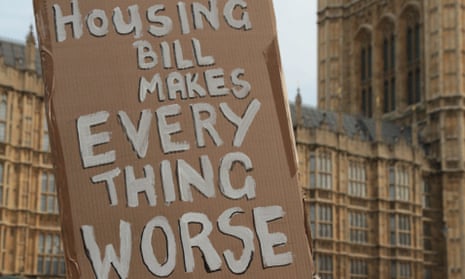Satire writes itself sometimes. “Tories reject move to ensure rented homes fit for human habitation” is a shocking headline, but without a jot of hyperbole.
During the final stages of the housing bill in the Commons on Tuesday, a Labour amendment to ensure landlords were required to keep homes in a liveable standard was voted down by 312 votes to 219, voted for by almost the entire Conservative party. Their argument, that it would be a burden upon landlords and discourage people from renting out homes, is of no comfort to the tenants living in Rachmanesque conditions with pest infestations, damp and mould.
Perhaps, if homes aren’t fit for human habitation, they shouldn’t be let out to humans for habitation?
When you dig deeper into the interests of MPs, the motives become a little clearer, but no less murky, ethically. Scrutinising the register of members’ financial interests, 39% of Conservative MPs are landlords, renting out at least one property. A total of 196 MPs are landlords: a rise of over a quarter since the last parliament, which still saw 25% of elected politicians owning at least one home they let out.
Certain politicians stand out for their interest in housing: Richard Benyon, the Conservative MP for Newbury, derives income from so many properties he can’t list them all in the register, simply listing his interests in property in a number of boroughs. David Tredinnick, the Conservative MP for Bosworth, earned more than £22,000 as a part time director of a property firm from May 2014 to May 2015.
Research body NatCen estimates that 2% of people in Britain are landlords: the rate among MPs is 15 times the national average. Few of them are renters: given how many own more than one home, the likelihood of MPs privately renting their main home at a rate similar to the population is miniscule.
Why does this matter? Because it means housing legislation is being formed by people with little personal connection to the housing crisis.
MPs may be aware of rising house prices, but are already asset-rich. For the hundreds of thousands of people in temporary accommodation, MPs voting against making houses habitable confirms their suspicions about the disconnection between elected officials and the electorate.
Few MPs have been homeless, increasingly few have lived in council or social housing at any point in their lives, and few are unable to buy their own homes. That’s why we’ve ended up with a housing bill that reflects the desires and interests of those who seek to profit from housing, including landlords and big housebuilders, to the detriment of those who desperately need good housing regardless of tenure.
The housing crisis was caused by a market that, as markets do, prioritised profit over need. Fewer homes were built after the financial crash, so house prices rose. There’s little incentive for large housebuilders to deliver enough housing to meet demand and therefore lower house prices, but plenty to deliver small numbers where it’s profitable, and land bank to raise land value prices. The Guardian reported last week that half a million homes have planning permission but have not been built - an increase of 25% in the space of five years.
That the rate of landlordism among MPs has risen so rapidly since the last parliament is not benign, when amendments that benefit landlords and endanger tenants are passed, with scores of Tory landlords voting down the amendment.
But the fact that it isn’t seen as scandalous within the house speaks of the culture of the Commons, and how distant, financially and socially, MPs are from their most vulnerable constituents. Many MPs will argue they are “accidental landlords”, letting out a flat after moving in with a partner, or leaving an area, but a bit of honesty about their vested interests and the fact they are in such a privileged financial position in the first place would go a long way.
Ultimately, it’s difficult to argue that we have the best housing policy for those hit by both the housing and financial crises, when those making the laws also stand to profit from them.
Sign up for your free Guardian Housing network newsletter with news and analysis sent direct to you every Friday. Follow us: @GuardianHousing

